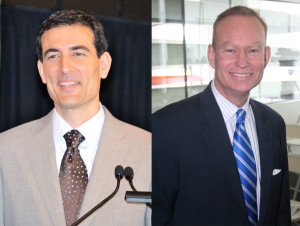Taxpayer support, hotel a must for Oklahoma City convention center, study says

by Patrick B. McGuigan | Oklahoma Watchdog
OKLAHOMA CITY — Five years after completion, an economic development analysis making the case for a new convention center is back in the news — at least for the man who wants to unseat the incumbent mayor in the March 4 mayoral election.
Oklahoma City Ward 2 Council Member Ed Shadid, left, and incumbent Mayor Mick Cornett face off in the March 4 mayoral contest.
The 2009 analysis prepared for the Greater Oklahoma City Chamber of Commerce assumed taxpayer subsidies would be required to operate convention facilities, more or less permanently, as is the widespread practice in the convention and visitor business across America.
The analysis documented around $10 million in operating subsidies for the existing tax-supported Cox Convention Center during the three years examined.
The mayoral contest pits incumbent Mayor Mick Cornett, who favored passage of the local development plan, against Ward 2 City Council Member Ed Shadid, who has questioned the convention center financing and the need for a “headquarters hotel.” Voters in 2009 approved $250 million for a new center to make the city more competitive.
“The mayor is looking forward and not backward to a report with data that is a decade old,” Brenda Jones, spokesman for the “Mick for Mayor” campaign and president of Jones PR, told Oklahoma Watchdog. “This is not really a campaign issue. This is an issue that’s not even in play. That is an issue of city governance, and we are not even there yet. Just because a consultant said something then does not mean it’s being considered.”
Shadid contended Cornett’s “unwillingness to comment on the controversy regarding the development of the new convention center complex is actually a reflection on the indefensible nature of his comments over the past four years.”
“If any literature or public statements by Cornett explaining the true costs and risk of this venture existed, we would have seen them by now,” Shadid said.
The 2009 analysis observed a “new headquarters hotel will be needed to attract desirable levels of convention, tradeshow and meeting event potential unique to Oklahoma City.”
Shadid said voters were misled because Cornett withheld information that estimates of improved performance in the convention business “were dependent on also building what almost certainly would be a publicly subsidized, if not publicly-owned hotel, coming up with additional funds for parking and finding land which would allow us to afford construction of a 285,000(square-foot) center.”
The analysis by the consulting firm Conventions Sports and Leisure International projected “direct spending” by visitors to conventions held locally had reached more than $16 million annually and could grow to $45 million if the city built expanded convention facilities. The analysis also projected increased tax revenue from expanded convention operations.
Shadid slammed Cornett, saying “There is no city that has been able to double, much less triple their existing convention business by building a new convention center.”
The report was financed by the Greater Oklahoma City Chamber of Commerce. The chamber has declined to release the document to the public, and the City Council did not press for its release.
Oklahoma Watchdog asked for a copy of the full document, but was given only an executive summary. Chamber staff allowed on-site access to the entire 89-page report, which was examined during three sessions at the group’s downtown office. Concerning a hotel linked to a new convention center, authors of the analysis said, “costs to develop headquarter hotels are significant. There are no examples nationwide of a fully privately-developed convention center headquarter hotel in at least the last 10 years.”
The report authors outlined two possible means of tax financing without, however, indicating a clear preference for either.
The financing suggestions included:
- Financial subsidies from city taxpayers to the developer in form of tax increment financing.
- Public construction of parking or infrastructure at the hotel.
- Land donations, cash contributions, or both.
- Formation of a publicly funded corporation or authority with the ability to issue debt. The corporation would own the facility “for a number of years and will then sell the hotel into the private market.”
“Regardless of potential future convention facility development in Oklahoma City, public subsidies will continue to be necessary in order to operate the Cox Convention Center into the foreseeable future,” the analysis said.
Contact Pat at pmcguigan@watchdog.org .
The post Taxpayer support, hotel a must for Oklahoma City convention center, study says appeared first on Watchdog.org.







